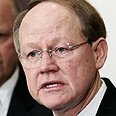
"They may deploy resources to mount attacks outside the country." Mike McConnell told a Senate hearing, although he also said that fewer than 100 terrorists have moved to establish cells in other countries.
McConnell also told the Senate Intelligence Committee that the Taliban, once thought to be routed from Afghanistan, has expanded its operations into previously peaceful areas of the west and around the capital of Kabul, despite the death or capture of three top commanders in the last year.
The al-Qaeda terrorist network in Iraq and in Pakistan and Afghanistan has suffered setbacks, McConnell said, but he added that Osama bin Laden's organization remains the No. 1 threat.
"Al-Qaeda remains the pre-eminent threat against the United States, both here at home and abroad," McConnell said. He said that al-Qaeda maintains a "safe haven" in Pakistan's tribal areas, where the group is able to stage attacks supporting the Taliban in Afghanistan.
The Pakistani tribal areas provide al-Qaeda "many of the advantages it once derived from its base across the border in Afghanistan, albeit on a smaller and less secure scale," allowing militants to train for strikes in Pakistan, the Middle East, Africa and the United States, McConnell said.
Terrorists use the "sanctuary" of Pakistan's border area to "maintain a cadre of skilled lieutenants capable of directing the organization's operations around the world," he said.
US officials have said they believe that bin Laden is taking refuge in the region, likely on the Pakistani side of the border.
The US has expressed growing concern that al-Qaeda figures who fled Afghanistan after the ouster of the Taliban regime in 2001 have been able to regroup inside tribal regions, posing a threat not just to US forces across the border, but offering a potential base for global operations.
Still, McConnell praised Pakistan's cooperation in the fight against extremists, saying that hundreds of Pakistanis have died while fighting terrorists. He said Islamabad has done more to "neutralize" terrorists than any other partner of the United States.
'Homegrown terrorists posed a threat as well'
Despite the Pakistani cooperation, Lt. Gen. Michael Maples, director of the Defense Intelligence Agency, said at the same hearing that the Pakistani military has been unable to disrupt or damage al-Qaeda terrorists operating in the tribal border region. And the US military is prohibited by Pakistan from pursuing Taliban and al-Qaeda fighters that cross the border to conduct attacks inside Afghanistan.
In other troubling parts of the world, the intelligence director said North Korea was proceeding with a nuclear program despite an agreement last year to suspend operations and Iran was "keeping open the option" of building nuclear weapons.
The United States remains "uncertain about Kim Jong Il's commitment to full denuclearization, as he promised in the six-party agreement," McConnell said, referring to the North's leader and to the nuclear talks involving the U.S., the Koreas, Japan, China and Russia.
Increases in military spending have enabled Russia to reverse deterioration of its military forces that set in as the Soviet Union collapsed, McDonnell said, and China's military modernization "will put American forces at greater risk."
Also testifying, FBI Director Robert Mueller said al-Qaeda continues to present a "critical threat to the homeland" and warned that "homegrown terrorists" not directly linked to al-Qaeda posed a threat as well.
After terrorism and weapons of mass destruction, McConnell said the threat from cyberattacks to US information systems is the most pressing issue. President Bush signed a classified directive in January outlining steps the federal government is taking to protect its networks.
"It is no longer sufficient for the US government to discover cyber intrusions in its networks, clean up the damage and take legal or political steps to deter further intrusions," McConnell said.
On Cuba, he said the intelligence community is not expecting an immediate political convulsion if ailing President Fidel Castro dies.
"We assess the political situation in Cuba will at least remain stable in the first few months after Fidel's death," McConnell said.
But policy missteps on the part Castro's successor could lead to mass migration of Cubans to the United States, he said.















